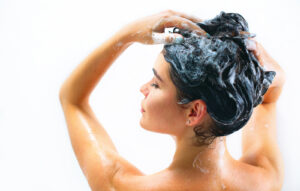What Every Health-Conscious Hair Consumer Should Know
When you think of alcohol, your mind might go straight to happy hour—but did you know that alcohol is also a major player in your hair care routine? In fact, it’s in everything from your shampoo and conditioner to styling gels and serums. The problem is, not all alcohols in hair products are created equal. Some can dry out your strands and irritate your scalp, while others provide crucial moisture, manageability, and softness, especially for damaged or thinning hair.
At Eldorado, we specialize in hair restoration, hair systems, laser therapy, and non-surgical hair replacement. Our goal is to help every client—from those experiencing hair loss to anyone seeking healthier, fuller-looking hair—make informed choices about the products they use daily. And that starts with understanding the difference between good and bad alcohols in hair care.
Understanding Alcohol in Hair Products
Before we break down the good versus the bad, it’s helpful to understand why alcohol is used in hair care at all.
Alcohols are added to hair products for multiple reasons:
- To act as preservatives
- To help ingredients mix properly
- To improve the product’s texture or feel
- To encourage faster drying times in styling products
But depending on the type of alcohol used, the impact on your hair can vary significantly. The wrong alcohol can lead to dryness, breakage, and irritation—which is especially concerning for those with fine, thinning, or chemically treated hair.
The “Bad” Alcohols: What to Avoid for Healthy Hair
When we talk about “bad” alcohols in hair care, we’re referring to short-chain alcohols. These evaporate quickly, which is great for fast-drying formulas—but not so great for your hair’s health.
Examples of Bad Alcohols in Hair Products:
- Isopropyl alcohol
- Ethanol
- SD alcohol (Specially Denatured alcohol)
- Propyl alcohol
- Alcohol denat.
Why They’re Problematic:
Short-chain alcohols have a drying effect. They strip away your hair’s natural oils, which are essential for shine, strength, and elasticity. For individuals experiencing hair loss or using non-surgical hair replacement systems, this can make matters worse by causing:
- Increased breakage
- Split ends
- Dry, brittle texture
- Scalp irritation and inflammation
If your goal is to restore hair health, retain moisture, or protect hair systems, products with these types of alcohol should be minimized—or avoided altogether.
The “Good” Alcohols: Your Hair’s Secret Allies
Now for the good news: Not all alcohols are harmful. In fact, long-chain fatty alcohols are essential components in many high-quality hair care products. These are derived from natural sources like coconut oil or palm oil, and instead of drying your hair, they moisturize, soften, and protect.
Examples of Good Alcohols in Hair Products:
- Cetyl alcohol
- Stearyl alcohol
- Cetearyl alcohol
- Behenyl alcohol
- Lauryl alcohol
Why They’re Beneficial:
These alcohols are emollients, meaning they help smooth and soften hair fibers while locking in moisture. You’ll often find them in:
- Deep conditioners
- Hair masks
- Moisturizing shampoos
- Leave-in treatments
- Hair systems maintenance products
In fact, for anyone dealing with thinning hair, frizz, or dryness, fatty alcohols can actually improve the overall health and appearance of the hair by:
- Strengthening the hair shaft
- Detangling and improving manageability
- Supporting scalp health
- Protecting hair systems from drying out or degrading
How This Applies to Hair Restoration and Hair Systems
At Eldorado, we’ve worked with thousands of clients undergoing hair transplants, laser therapy, and non-surgical hair restoration. One of the first things we teach is that your at-home hair care routine matters just as much as the treatment itself.
Whether you’re using a custom hair system, growing back natural hair, or maintaining a transplant, avoiding harmful ingredients is crucial to long-term success. This includes steering clear of drying alcohols that can:
- Weaken bonds in hair systems
- Dry out adhesive or scalp
- Cause premature wear of extensions or weaves
- Exacerbate shedding in natural hair
Instead, we guide our clients toward alcohol-free or fatty alcohol-enriched products designed for fragile or restored hair.
How to Choose Hair Products for Hair Replacement or Restoration
Whether you’re wearing a custom hair system, recovering from a hair transplant, styling extensions, or caring for a high-quality wig, your hair care products can make or break your results—literally. These options each have unique needs, and selecting the right products ensures longevity, appearance, and comfort.
Hair Systems & Non-Surgical Hair Replacement
Hair systems require delicate handling and specially formulated products that won’t damage the base, weaken adhesive, or dry out the hair strands.
What to Look For:
- Sulfate-free shampoos that cleanse gently
- Leave-in conditioners with fatty alcohols (like cetyl or stearyl alcohol)
- Low-alcohol styling products to prevent stiffness and flaking
- pH-balanced formulas to preserve the scalp and the unit
Avoid:
- Products with isopropyl alcohol or alcohol denat., which can dry and shorten the life of the system
- Harsh clarifying shampoos unless prescribed for adhesive removal
Post-Transplant Hair Care
After a hair transplant, your scalp is healing—and that means it’s sensitive to everything from water pressure to ingredients. The goal is to nourish the new grafts without disrupting their growth.
What to Look For:
- Doctor-approved gentle cleansers (usually mild baby shampoo or sulfate-free options)
- Alcohol-free serums with growth-supporting ingredients like biotin, niacinamide, or caffeine
- Fragrance-free or lightly scented formulas to reduce irritation
- Moisturizers with natural oils and fatty alcohols
Avoid:
- Drying alcohols and styling products in the first few weeks post-op
- Heavy silicones that can build up near grafts
Extensions (Clip-in, Tape-in, Sew-in)
Extensions—whether synthetic or human hair—need proper moisture to avoid tangling and shedding. Because they’re not connected to your scalp’s natural oil system, they dry out faster.
What to Look For:
- Moisture-rich shampoos and conditioners
- Leave-in sprays with fatty alcohols and UV protection
- Sulfate-free and low-alcohol products to prevent adhesive weakening (for tape-ins)
Avoid:
- Clarifying shampoos or products with ethanol and propyl alcohol
- Alcohol-heavy sprays or mousses that dry out the bonds
Wigs (Synthetic and Human Hair)
Caring for wigs means treating them gently while preserving their texture and style. The type of wig (synthetic vs. human hair) affects the product recommendations.
What to Look For (Human Hair Wigs):
- Sulfate-free moisturizing products
- Detangling sprays with good alcohols like cetearyl alcohol
- Heat protectant sprays if styling with tools
What to Look For (Synthetic Wigs):
- Wig-specific shampoos and conditioners
- Lightweight sprays that restore luster without buildup
Avoid:
- Regular hair products on synthetic wigs—they can cause tangling and dullness
- Alcohol-heavy styling sprays or gels
How to Read Labels and Choose the Right Products
When you’re shopping for shampoos, conditioners, or styling products, the ingredient list is your best friend. Look for fatty alcohols high on the list and avoid short-chain alcohols in the top five ingredients, especially in leave-in or daily-use products.
🔍 Quick Label Check Guide:
| Ingredient | Good or Bad? | Purpose |
| Cetyl alcohol | ✅ Good | Moisturizing, smoothing |
| Isopropyl alcohol | ❌ Bad | Fast drying, can be harsh |
| Stearyl alcohol | ✅ Good | Softens and protects |
| Ethanol | ❌ Bad | Dries out scalp and hair |
| Cetearyl alcohol | ✅ Good | Adds slip, detangles |
| Alcohol denat. | ❌ Bad | Evaporates moisture |
Clean Hair = Healthy Hair Growth
Clean hair doesn’t just mean free of dirt. It means free of harsh chemicals and harmful alcohols. If you’re serious about improving your hair’s health or maintaining a hair restoration treatment, it’s time to upgrade your product lineup. Pay attention to what’s going on your scalp, especially if you’re experiencing:
- Hair thinning or breakage
- Dry or flaky scalp
- Hair system wear and tear
- Slow hair growth despite treatments
Eldorado’s Commitment to Healthy Hair
At Eldorado Hair Restoration Center, we’re more than a treatment provider—we’re a partner in your hair health journey. That means helping you understand not just what your hair needs medically, but what it needs every single day through your shampoo, conditioner, and styling choices.
Whether you’re seeking:
- Hair transplant consultation
- Non-surgical hair replacement
- Hair systems maintenance
- Custom hairpieces
- Laser hair therapy
- At-home care product guidance
Our experts are here to support and personalize your plan.
Ready to Transform Your Hair Routine?
If you’re not sure which products are best for your hair type or treatment plan, we’re here to help. Contact Eldorado for a free hair analysis and let our team recommend the safest, most effective hair care regimen based on your needs.
Final Thoughts
Your hair deserves better than harsh chemicals disguised as everyday convenience. By learning to identify the good vs. bad alcohols in hair care, you’re already one step closer to stronger, healthier, fuller hair. Choose wisely. Nourish your hair. Let Eldorado guide the way!





